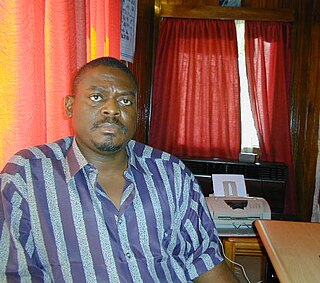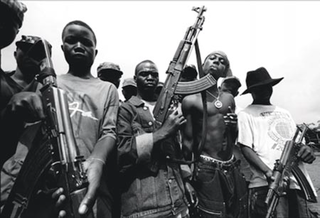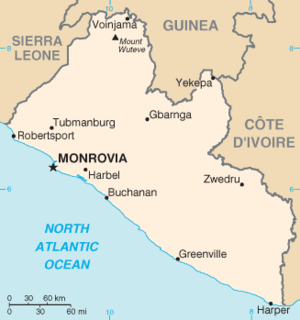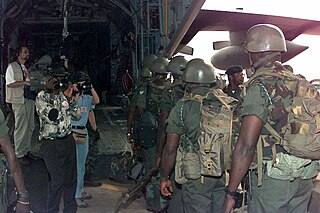
The foreign relations of Ghana are controlled by the Ministry of Foreign Affairs of Ghana. Ghana is active in the United Nations and many of its specialised agencies, the World Trade Organization, the Non-Aligned Movement, the Organisation of African Unity (OAU), the African Union (AU) and the Economic Community of West African States. Generally, it follows the consensus of the Non-aligned Movement and the OAU on economic and political issues not directly affecting its own interests. Ghana has been extremely active in international peacekeeping activities under UN auspices in Lebanon, Afghanistan, Rwanda, and the Balkans, in addition to an eight-year sub-regional initiative with its ECOWAS partners to develop and then enforce a cease-fire in Liberia. Ghana is also a member of the International Criminal Court.

Liberia, officially the Republic of Liberia, is a country on the West African coast. It is bordered by Sierra Leone to its northwest, Guinea to its north, Ivory Coast to its east, and the Atlantic Ocean to its south and southwest. It has a population of around 5 million and covers an area of 111,369 square kilometers (43,000 sq mi). English is the official language, but over 20 indigenous languages are spoken, reflecting the country's ethnic and cultural diversity. The country's capital and largest city is Monrovia.

Liberia is a country in West Africa founded by free people of color from the United States. The emigration of African Americans, both free and recently emancipated, was funded and organized by the American Colonization Society (ACS). The mortality rate of these settlers was the highest in accurately recorded human history. Of the 4,571 emigrants who arrived in Liberia between 1820 and 1843, only 1,819 survived.

The Politics of Liberia takes place in a framework of a presidential representative democratic republic modeled on the government of the United States, whereby the President is the head of state and head of government; unlike the United States, however, Liberia is a unitary state as opposed to a federation and has a pluriform multi-party system rather than the two-party system that characterizes US politics. Executive power is exercised by the government. Legislative power is vested in both the government and the two chambers of the legislature.

The Armed Forces of Liberia (AFL) are the armed forces of the Republic of Liberia. Tracing its origins to a militia that was formed by the first black colonists in what is now Liberia, it was founded as the Liberian Frontier Force in 1908, and retitled in 1956. For almost all of its history, the AFL has received considerable materiel and training assistance from the United States. For most of the 1941–89 period, training was largely provided by U.S. advisers, though this assistance has not prevented the same generally low levels of effectiveness common to most of the armed forces in the developing world.

Major Johnny Paul Koroma was the head of state of Sierra Leone from May 1997 to February 1998.

The First Liberian Civil War was an internal conflict in Liberia from 1989 until 1997. The conflict killed around 200,000 people and eventually led to the involvement of the Economic Community of West African States (ECOWAS) and of the United Nations. The peace did not last long, and in 1999 the Second Liberian Civil War broke out.

The Asian–African Legal Consultative Organization (AALCO) is an international governmental organization formed in 1956, initially to serve as an advisory board to member states on matters on international law. It was an outgrowth of the Bandung Conference, held in Indonesia during April, 1955, which led to the establishment of the Asian Legal Consultative Committee (ALCC). In April, 1958, it changed its name to the Asian-African Legal Consultative Committee (AALCC) to reflect the growth of its membership beyond the African side of the United Arab Republic. Since 2001, it has been known by its current name, the AALCO, reflecting the growth of its international status; currently an intergovernmental organization having received a standing United Nations invitation to participate as an observer in the sessions and the work of the General Assembly and maintaining a permanent office at Headquarters.

The Second Liberian Civil War began in 1999 when a rebel group backed by the government of neighbouring Guinea, the Liberians United for Reconciliation and Democracy (LURD), emerged in northern Liberia. In early 2003, a second rebel group, the Movement for Democracy in Liberia (MODEL), emerged in the south, and by June–July 2003, Charles Taylor's government controlled only a third of the country.
The National Patriotic Front of Liberia (NPFL) was a Liberian rebel group that initiated and participated in the First Liberian Civil War from 1989 to 1996.
Conciliation Resources is an independent organization working with people in conflict to prevent violence and build peace, providing advice, support, and practical resources. It also takes the lessons learned to government decision-makers and others working to end the conflict to improve peacebuilding policies and practice worldwide.

United Nations Security Council resolution 788, adopted unanimously on 19 November 1992, after determining that the deterioration of the situation in Liberia constituted a threat to international peace and security, the council imposed an arms embargo on the country for the purposes of establishing peace and stability.

United Nations Security Council Resolution 813, adopted unanimously on 26 March 1993, after reaffirming Resolution 788 (1992) and determining that the situation in Liberia constituted a threat to international peace and security, the Council condemned the failure of the parties in the country – the Armed Forces of Liberia, ULIMO, National Patriotic Front of Liberia and Independent National Patriotic Front of Liberia among others, to implement the Yamoussoukro IV Accord.

United Nations Security Council resolution 1014, adopted unanimously on 15 September 1995, after recalling all resolutions on the situation in Liberia, particularly 1001 (1995), the council discussed various aspects of the civil war and extended the mandate of the United Nations Observer Mission in Liberia (UNOMIL) until 31 January 1996.

United Nations Security Council resolution 1020, adopted unanimously on 10 November 1995, after recalling all resolutions on the situation in Liberia, particularly 1001 (1995), the Council discussed the implementation of the peace process during the First Liberian Civil War and adjusted the mandate of the United Nations Observer Mission in Liberia (UNOMIL) to include other functions.

United Nations Security Council resolution 1059, adopted unanimously on 31 May 1996, after recalling all resolutions on the situation in Liberia, particularly Resolution 1041 (1996), the Council extended the mandate of the United Nations Observer Mission in Liberia (UNOMIL) until 31 August 1996 and discussed the security situation in the country.

United Nations Security Council resolution 1083, adopted unanimously on 27 November 1996, after recalling all resolutions on the situation in Liberia, particularly Resolution 1071 (1996), the Council extended the mandate of the United Nations Observer Mission in Liberia (UNOMIL) until 31 March 1997 and discussed matters relating to UNOMIL.

United Nations Security Council resolution 1306, adopted on 5 July 2000, after recalling all previous resolutions on the situation in Sierra Leone, particularly resolutions 1132 (1997), 1171 (1998) and 1299 (2000), the Council decided to prohibit the direct or indirect import of rough diamonds from the country. The rebel Revolutionary United Front controlled 90% of the diamond-producing areas in Sierra Leone and was using diamonds to finance its operations.

United Nations Security Council resolution 1478, adopted unanimously on 6 May 2003, after recalling resolutions 1132 (1997), 1171 (1998), 1306 (2000), 1343 (2001), 1385 (2001), 1395 (2002), 1400 (2002), 1408 (2002), 1458 (2003), 1467 (2003) and others on the situation in Liberia, the Council extended sanctions against the Liberian government for an additional period of twelve months until 7 May 2004 and imposed a ban on imports of its timber for ten months.
International Contact Groups are "informal, non-permanent international bodies that are created ad hoc, with the purpose of coordinating international actors in their aim of managing a peace and security crisis in a specific state or region (single-issue). They are founded and formed out of by states and/or International Organizations/Regional Organizations. They do not have own administrative structures, but are official announced and meet periodically." Since 1977, at least 27 ICGs have been formed.














